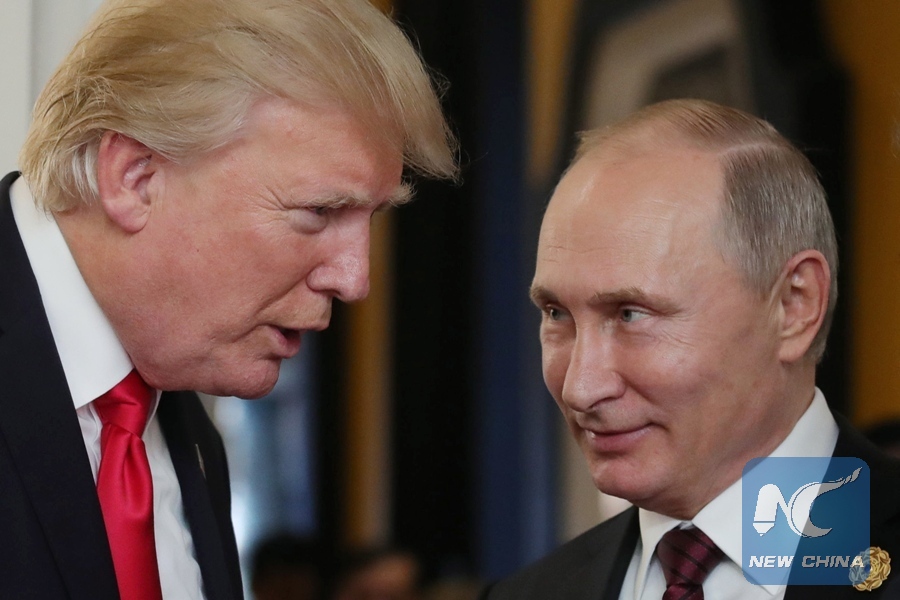
File photo taken on Nov. 11, 2017 shows U.S. President Donald Trump (L) speaking with Russian President Vladimir Putin as they attend the APEC Economic Leaders' Meeting in Danang, Vitenam. (Xinhua/AFP)
by Matthew Rusling
WASHINGTON, Dec. 28 (Xinhua) -- U.S.-Russia relations remain at a low point near the year's end, and the chill is not expected to thaw in 2018, U.S. experts said.
"U.S. relations with Russia are at a low point," Brookings Institution Senior Fellow Darrell West told Xinhua.
Washington's relationship with Moscow has been sour for some time, amid disagreements involving the war in Syria, the conflict in Ukraine and the Kremlin's alleged meddling in the 2016 U.S. presidential elections, among others.
"Many Americans mistrust (Russian President Vladimir) Putin and feel he interfered with the 2016 election in favor of (U.S. President Donald) Trump," West said.
"They do not like his...efforts to expand Russian influence over Eastern Europe. Most still oppose his annexation of Crimea. All of that makes it difficult to normalize relations and treat Russia as friendly power," the expert added.
"Trump hoped to elicit Russia's help on the fight against terrorism. But Putin, in Washington's eyes, has done little to aid that effort and has expanded his country's role in Syria," West said, speaking of the conflict in Syria.
While the Islamic State (IS) radicals have been on the run in the Middle East after a multinational bombing and military efforts, IS-inspired or affiliated attacks have occurred in recent months in Europe, showing no sign of slowing.
"It doesn't look like 2018 will be any different, as Putin has little incentive to help Trump since the latter has not reduced Russian sanctions," West said, referring to Washington's ongoing sanctions against Moscow.
April saw the U.S. Congress pass sanctions with bipartisan, veto-proof majorities, which underscored the fact that it believes the United States cannot work with Russia, despite Trump's hopes several months ago that the two could partner on a number of issues, analysts said.
The worsening of ties could manifest itself in even more sanctions in the future, as well as closer U.S. relations with other nations in the region, some experts have argued.
Some also predict that the United States will send defensive weaponry to Ukraine in 2018, and that Eastern Europe, such as the Baltic states and Poland, will see an increased U.S. military presence. The world may also see further deployment of U.S. strategic bombers to Europe, especially Britain, as a warning to Russia.
Analysts also predict Washington's strengthened partnership with countries like Poland, noting that the United States and Poland are seeing increasingly warm relations, adding that Trump chided Russia, a traditional Polish adversary, in a speech from Warsaw earlier this summer.
"Putin has expanded his country's power in Eastern Europe. Hungary is very much in the Putin camp ...Russia has reasserted considerable influence over Eastern Europe," West said.
Other analysts agreed that U.S.-Russia relations have seen better days, and are unlikely to improve in 2018.
U.S.-Russia ties have been strained, Dan Mahaffee, senior vice president and director of policy at the Center for the Study of the Presidency and Congress, told Xinhua.
The U.S. Congress remained concerned about what lawmakers believe was a Russian threat to the United States and key allies, and were unconvinced that a rapprochement with Russia could somehow solve issues on Ukraine, Syria, Iran, and the Korean Peninsula, Mahaffee said.
That sentiment was underscored in a recent speech by H.R. McMaster, Trump's national security adviser, in which he called Russia a "revisionist" power that posed a number of threats to the United States.
Washington billed Moscow as a revisionist power because it has been seen as a competitor to U.S. interests, seeking to establish spheres of influence in Eastern Europe, despite the relationships the United States has with allies in the region, said Mahaffee.
Commenting on the heightened rhetoric between the two sides, some analysts have said it amounted to a strong U.S. desire to push back what the Trump administration views as Russian assertiveness. Others have said there has been a sense among some of Trump's top team that Russia has been taking advantage of the United States.
Russian Foreign Ministry spokeswoman Maria Zakharova said Thursday Russia had been proposing since the 1990s to reach an official agreement with the United States to guarantee non-interference in each other's affairs, but Washington has consistently rejected this.

